Hamstring Stretch

Stretching keeps you flexible and improves your range of motion, or how far you can move your joints in certain directions. It also helps you lower your odds of pain and injuries.
Always warm up with a 5-minute walk first. Lie down when you're ready to stretch your hamstring. Loop a bed sheet around your right foot. Use the sheet to help pull the straight leg up. Hold for 20 seconds, then lower the leg. Repeat twice. Then, switch legs.
Calf Stretch
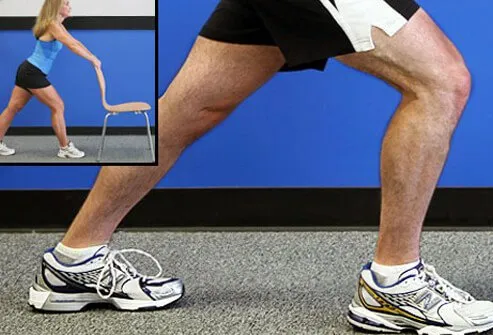
Hold onto a chair for balance. Bend your right leg. Step back with your left leg, and slowly straighten it behind you. Press your left heel toward the floor. You should feel the stretch in the calf of your back leg. Hold for 20 seconds. Repeat twice, then switch legs.
For more of a stretch, lean forward and bend the right knee deeper -- but don’t let it go past your toes.
Straight Leg Raise
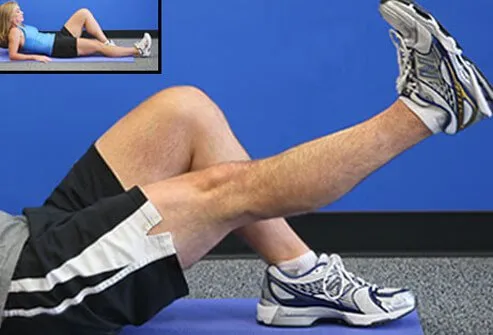
Build muscle strength to help support weak joints.
Lie on the floor, upper body supported by your elbows. Bend your left knee, foot on the floor. Keep the right leg straight, toes pointed up. Tighten your thigh muscles and raise your right leg.
Pause, as shown, for 3 seconds. Keep your thigh muscles tight and slowly lower your leg to the ground. Touch and raise again. Do two sets of 10 repetitions. Switch legs after each set.
Quad Set
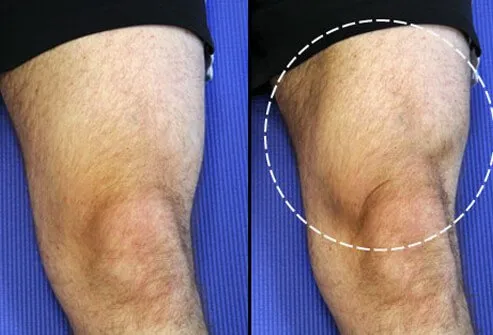
Is the straight leg raise too tough? Do quad sets instead. With these you don’t raise your leg. Simply tighten the thigh muscles, also called the quadriceps, of one leg at a time.
Start by lying on the floor. Keep both legs on ground, relaxed (left photo). Flex and hold left leg tense for 5 seconds (right photo). Relax. Do two sets of 10 repetitions. Switch legs after each set.
Seated Hip March
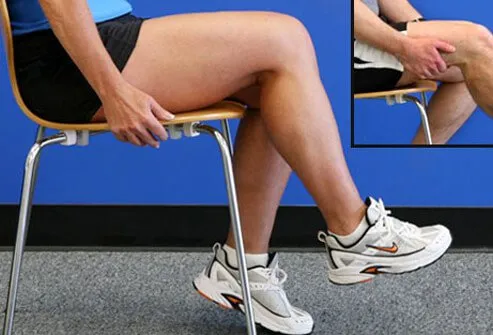
Strengthen your hips and thigh muscles. It can help with daily activities like walking or standing up.
Sit up straight in a chair. Kick your left foot back slightly, but keep your toes on the floor. Lift your right foot off the floor, knee bent. Hold the right leg in the air 3 seconds. Slowly lower your foot to the ground. Do two sets of 10 repetitions. Switch legs after each set.
Too hard? Use your hands to help lift your leg.
Pillow Squeeze
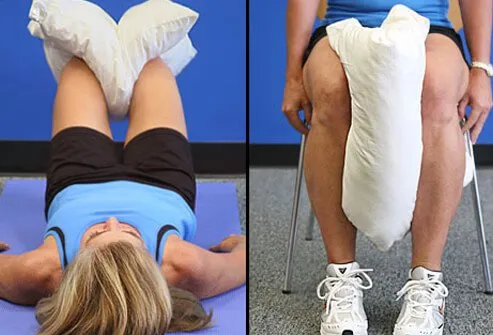
This move helps strengthen the inside of your legs to help support your knees. Lie on your back, both knees bent. Place a pillow between the knees.
Squeeze your knees together, squishing the pillow between them. Hold for 5 seconds. Relax. Do two sets of 10 repetitions. Switch legs after each set.
Too tough? You can also do this exercise while seated.
Heel Raise
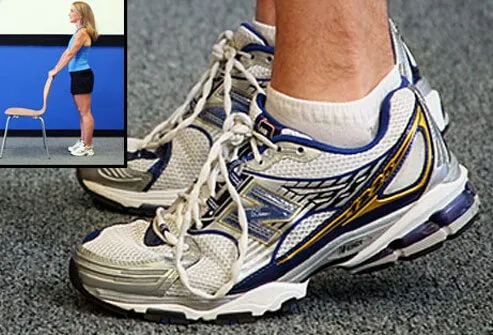
Stand tall and hold the back of a chair for support. Lift your heels off the ground and rise up on the toes of both feet. Hold for 3 seconds. Slowly lower both heels to the ground. Do two sets of 10 repetitions.
Too tricky? Do the same exercise while sitting in a chair.
Side Leg Raise
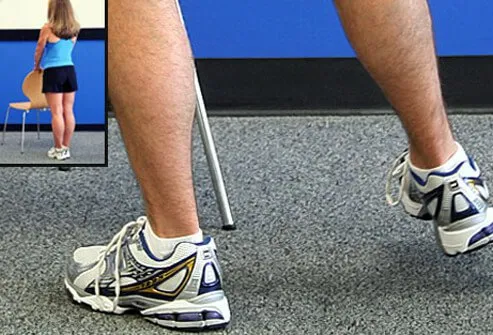
Stand and hold the back of a chair for balance. Place your weight on your left leg. Stand tall and lift the right leg out to the side -- keep the right leg straight and outer leg muscles tensed. Hold 3 seconds, then slowly lower the leg. Do two sets of 10 repetitions. Switch legs after each set.
Too hard? Increase leg height over time. After a few workouts, you’ll be able to raise it higher.
Sit to Stand
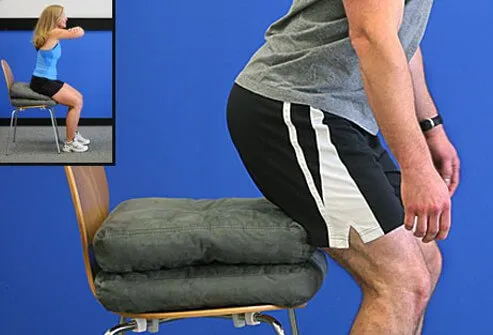
Practice this move to make standing easier. Place two pillows on a chair. Sit on top, with your back straight, feet flat on the floor (see left photo). Use your leg muscles to slowly and smoothly stand up tall. Then lower again to sit. Be sure your bent knees don’t move ahead of your toes. Try with your arms crossed or loose at your sides.
Too tough to do? Add pillows. Or use a chair with armrests and help push up with your arms.
One Leg Balance
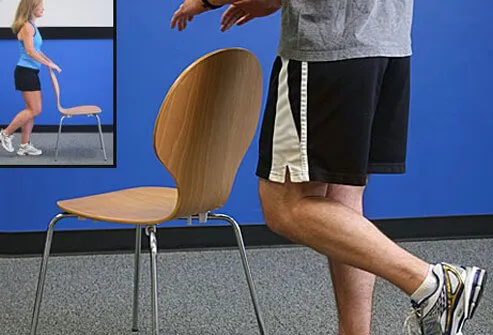
This move helps you bend over or get in and out of cars.
Stand behind your kitchen counter without holding on, and slowly lift one foot off the floor. The goal is to stay balanced for 20 seconds without grabbing the counter. Do this move twice, then switch sides.
Too easy? Balance for a longer time. Or try it with your eyes closed.
Step Ups
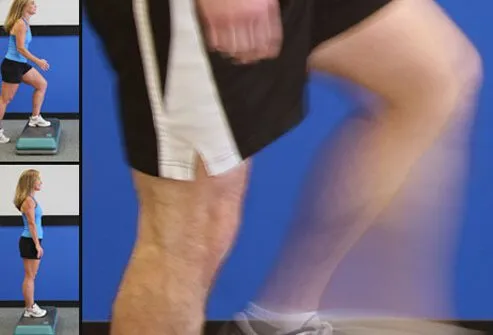
Do this to strengthen your legs for climbing steps.
Stand in front of stairs, and hold onto the banister for balance. Then place your left foot on a step. Tighten your left thigh muscle and step up, touching your right foot onto the step. Keep your muscles tight as you slowly lower your right foot. Touch the floor and lift again. Do two sets of 10 repetitions. Switch legs after each set.
Walking
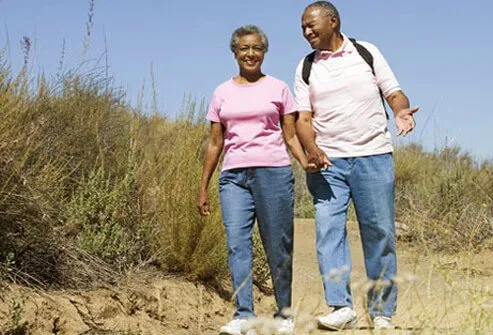
Even if you have stiff or sore knees, walking may be a great exercise. Start slow, stand tall, and keep at it. You can ease joint pain, strengthen your leg muscles, improve your posture, and improve your flexibility. It's also good for your heart.
If you're not active now, check in with your doctor before you start a new exercise program.
Low-Impact Activities
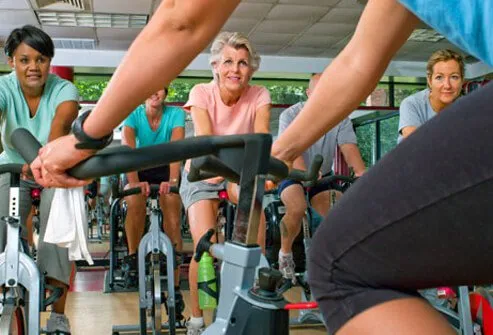
Other exercises that are easy on the knees include biking, swimming, and water aerobics. Water exercise takes weight off painful joints. Many community and hospital wellness centers, gyms, and pools offer classes for people with arthritis.
Being active may also help you lose weight, which takes pressure off your joints.
For favorite activities, like golf, ask your doctor or physical therapist how to safely make painful moves hurt less.
How Much Exercise?
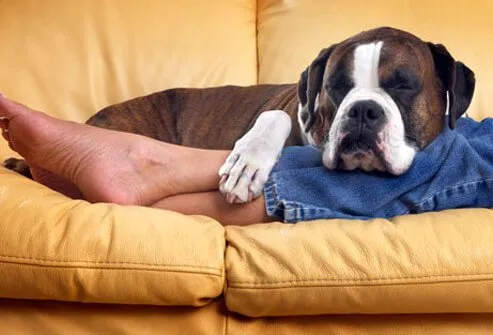
Thirty minutes a day is a good goal. Start small, like with 10 minutes every other day. If you don't have pain, exercise more to meet the goal.
Some mild muscle soreness is normal at first. It's OK to work through it. Check with your doctor if you want to try over-the-counter pain relievers like acetaminophen, ibuprofen, or naproxen to ease the soreness. Ice can also help. Don't ignore pain in your joints, though. Let your doctor know if you have any.
Slideshow: Exercises for Knee Osteoarthritis and Joint Pain
This tool does not provide medical advice. See additional information: 
© 1996-2024 WebMD, LLC. All rights reserved.
Source slideshow on WebMD
